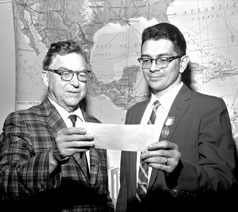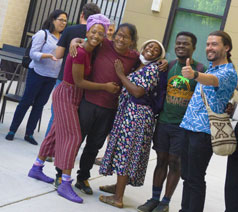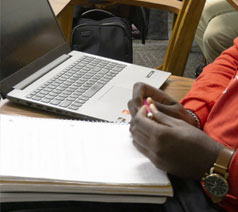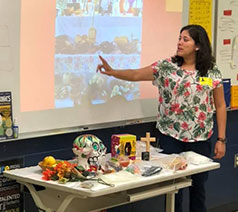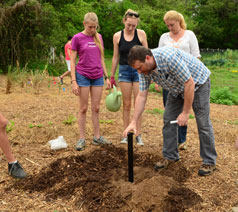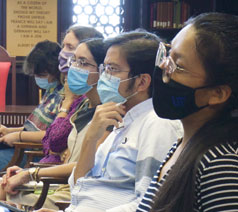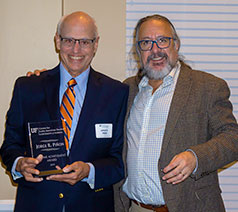Don Behringer
Associate Professor of Fisheries and Aquatic Sciences, School of Forest, Fisheries and Geomatic Sciences, Institute of Food and Agricultural Sciences (IFAS) and the Emerging Pathogens Institute
Dr. Behringer has begun collaborative research and scholarly exchanges with the University of Havana (UH). In summer 2015 he organized a study abroad course in cooperation with faculty from the University of Havana (UH) and is working with UH faculty from their Center for Marine Research on a project to determine the genetic structure of Caribbean spiny lobster populations around Cuba and their connections to lobster populations in Florida.
Carmen Diana Deere
Distinguished Professor Emerita of Latin American Studies and Food & Resource Economics, Center for Latin American Studies
Dr. Deere was Director of the Center for Latin American Studies, 2004-09, and began efforts to develop a university-wide Cuba Program at UF, serving as its first coordinator (2009-13). She was a plaintiff in the Florida universities lawsuit against the State of Florida for the ban imposed on the use of funds that pass through the university system for travel to countries on the U.S. State Department’s list of “state sponsors of terrorism” (which included Cuba until June of 2015). She is currently PI of the UF and UH collaborative research program on “The Agricultural Sector and the International Economy: Challenges and Opportunities for Cuba and the United States”.
Deere first carried out research on rural Cuba in the mid-1980s to mid-1990s, in the latter years under a MacArthur Foundation grant. Her collaborative study with members of the Rural Studies Team at UH was based on field research in three Cuban municipalities, including a 500 household rural income survey; she resided in Cuba for a total of 13 months. Her co-authored book, Güines, Santo Domingo y Majibacoa. Sobre sus historias agrarias (1998), was awarded the Best Book prize of the University of Havana and the Best Book prize (Social Sciences) of the Cuban Academy of Sciences. Deere’s current research is on the impact of the US-Cuban reciprocity trade agreements of 1902 and 1934 on US imports of fruits and vegetables from Cuba and the extent to which they contributed to the diversification of the Cuban agricultural sector.
Brian Gendreau
Clinical Professor of Finance, Department of Finance, Insurance and Real Estate, Warrington College of Business Administration
Dr. Gendreau is the Director of the Latin American Business Environment program at the Center for Latin American Studies. He is working with University of Havana (UH) economists on proposals for the reform of Cuba’s agricultural finance system as part of the UF and UH collaborative research program, “The Agricultural Sector and the International Economy: Challenges and Opportunities for Cuba and the United States.”
Lillian Guerra
Professor of Cuban and Caribbean History, Department of History, College of Liberal Arts and Sciences
Professor Guerra is a specialist of Latin American and Caribbean history and served as coordinator of the UF Cuba Program from 2013 to 2015. She also serves as the academic coordinator for the UF exchange with the Antonio Nuñez Jiménez Foundation. She has hosted numerous visits by prestigious Cuban intellectuals and historians. Together with her counterparts at the Nuñez Jiménez Foundation, Dr. Guerra has directed the research projects of UF graduate students and undergraduates of Cuban history in Cuba. The author of many articles and essays, Guerra has also published three books of history, Popular Expression and National Identity in Puerto Rico (1998), The Myth of José Martí: Conflicting Nationalisms in Early Twentieth-Century Cuba (2005), and Visions of Power in Cuba: Revolution, Redemption and Resistance, 1959-1971 (2012). In 2014, Visions of Power in Cuba received the prestigious Bryce Wood Book Award of the Latin American Studies Association.
Guerra is also the recipient of the American Council of Learned Societies Fellowship and the John Simon Guggenheim Fellowship for 2014-15. A creative writer, Guerra has also published a new book of poetry, Cimarrona (Verbum, 2013) and a book of short stories, Cartografía Corporal (Verbum, 2014), both explorations of Cuban identity on the island and abroad. Currently, she is completing two books of history, Making Revolutionary Cuba 1946-1958, for publication with Yale University Press, and with co-author Dr. Abel Sierra Madero, “I am the Revolution”: Political Education, the New Man and Sexuality in Cuba, 1959-1980 by UNC Press.
William Messina
Agricultural Economist, Department of Food and Resource Economics, Institute of Food and Agricultural Sciences (IFAS)
Mr. Messina is a co-founder and Co-Director of the IFAS/Department of Food and Resource Economics comprehensive research initiative to provide objective and current data, information and analysis on the agricultural and fisheries sectors in Cuba. Begun in 1994, this research continues to be conducted in collaboration with a team of researchers at the University of Havana, currently as part of the research program, “The Agricultural Sector and the International Economy: Challenges and Opportunities for Cuba and the United States.” Messina has published widely on Cuba’s agricultural sector and has made presentations on the topic throughout the United States, Latin America and the Caribbean, including testimony before U.S. House and Senate committees and the U.S. International Trade Commission, as well as staff briefings for the U.S. Department of Agriculture and the U.S. State Department.
Jon Mills
Professor of Law and Director of Center for Governmental Responsibility, Fredric G. Levin College of Law.
Professor Mills is Dean Emeritus of the Levin College of Law and currently Counsel to Boies, Schiller and Flexner L.L.P. Previously, he served in the Florida Legislature for ten years and was Speaker of the House in 1987-88. As a researcher and teacher, he has been a principal investigator and directed major studies attracting over six million dollars in grants on environmental and constitutional issues including international projects in Brazil, Poland, Haiti, and Central America. He has taught and lectured in Constitutional Law, International Trade and Environment in Costa Rica, Brazil, the University of Warsaw and Cambridge University. As a lawyer, he has appeared frequently in appellate court on constitutional issues, as well as in high-profile privacy right cases. He was the Reporter for the American Bar Association’s Task Force on Preservation of the Justice System and co-authored the Task Force Report and the ABA Resolution in 2011 supporting nationwide reforms. Mills has authored numerous law review and journal articles including “Whither Communism: A Comparative Perspective on Constitutionalism in a Postsocialist Cuba,” george wash. int’l l. rev (2009); “Law Schools as Agents of Change and Justice Reform in the Americas,” Fla. J. of Intl Law (2008); and “Resolving Property Claims in Post Socialist Cuba,” Georgetown J. of L. and Pol. in Intl Business (1995). He has authored or edited several books including Economic & Environmental Conflicts: A Case Study With Parana (Brazil) And Florida (USA)(1995); Privacy the Lost Right (2008); and Privacy in the New Media Age (2015).
Frederick S. Royce
Assistant Scientist, Agricultural and Biological Engineering Department, Institute of Food and Agricultural Sciences (IFAS)
Dr. Royce is Academic Coordinator for the University of Florida – University of Havana Collaborative Exchange. In this capacity he regularly communicates with counterparts at the University of Havana, seeking areas of common interest on which to base future collaborative research projects. He is also active in developing scientific collaborations with research institutes outside the University of Havana, notably the Instituto de Investigaciones de Sanidad Vegetal (INISAV), the Instituto de Investigaciones de la Caña de Azúcar (INICA), and the Instituto de Investigaciones en Fruticultura Tropical (IIFT). Royce first undertook field research in Cuba on a sugarcane production cooperative in 1995. His current research is within the framework of the UF and UH collaborative research program, “The Agricultural Sector and the International Economy: Challenges and Opportunities for Cuba and the United States”, for which he serves as project manager. This research will focus on the interactions between foreign investment and cooperative farming operations in rural Cuba. Royce has taught two graduate seminars at the Center for Latin American Studies: “Agrarian Cooperatives and Land Reform in Latin America” and “Cuban Agriculture”. Since 2003 he has led several University of Florida graduate student and faculty delegations to Cuba.
Laurie Taylor
Digital Scholarship Librarian, George A. Smathers Libraries
Dr. Taylor is UF’s Digital Scholarship Librarian, focusing on data curation, digital curation, and socio-technical (people, policies, technologies) needs for scholarly cyberinfrastructure. As the Technical Director for the international collaborative Digital Library of the Caribbean (dLOC, www.dloc.com), she works to build communities of practice related to digital libraries and digital scholarship for Caribbean Studies broadly as well as Cuban Studies.
Margarita Vargas-Betancourt
Caribbean Basin Librarian, George A. Smathers Libraries
As the Caribbean Basin Librarian, Dr. Vargas-Betancourt is in charge of processing Caribbean and Latin American manuscripts and of serving as liaison and reference to faculty and students. She is currently Co-PI in the Florida and Puerto Rico Digital Newspaper Project, funded by the National Endowment for the Humanities, National Digital Newspaper Program and Co-chair of the Society of American Archivists’ Latin American and Caribbean Cultural Heritage Archives (LACCHA) Roundtable. Through collaboration with Lillian Guerra, she is currently strengthening twentieth-century manuscript collections on the Cuban Revolution as well as working on collaborative projects with the Biblioteca Nacional José Martí and the Fundación Núñez Jiménez.

